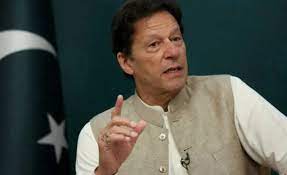Imran Khan, who served as prime minister before stepping down, has advocated for improved relations between Pakistan and India. However, he has made it abundantly apparent that such an improvement is not conceivable so long as the nationalist Bharatiya Janata Party (BJP) is in control in India.

The chairman of the Pakistan Tehreek-e-Insaf (PTI) shed light on the economic gains that may be gained if Pakistan and India develop commerce with each other in an interview that was conducted on Monday with the British daily The Telegraph.
“The advantages would be huge,” he added, but then he argued that the primary obstacle was New Delhi’s attitude toward Indian Illegally Occupied Jammu and Kashmir (IIOJK).
“I believe it is conceivable, but the BJP administration is so inflexible, and they take a nationalistic stand on subjects.
“It is disheartening because there is no prospect (for a settlement) as long as they continue to stir up these patriotic attitudes. “And once this genie of nationalism comes out of the bottle, it is extremely difficult to put it back in again,” the former premier said to The Telegraph. “It is very tough to put it back in.”
“All that we are aware of is that they need to have a plan for the resolution of the Kashmir conflict. People in Pakistan are unable to comprehend the fact that Kashmiris, who were granted the right by the international community to select their future for themselves via a referendum, has seen India steamroll this decision.
Imran also said that Pakistan’s relationship with its neighbouring nation, India, needs a cooling down period after India stripped IIOJK of its status as a state.
In August 2019, Pakistan took official action to reduce its trading links with India to the same level as those with Israel, a country with which Islamabad does not have any trade ties. The decision was made in response to India’s decision to abolish Article 370 of its constitution, which had accorded a unique status to occupied Kashmir.
The leader of the PTI went on to declare that if he were to be re-elected as prime minister, one of his top priorities would be to improve relations with all of Pakistan’s neighbouring countries, including Afghanistan, Iran, China, and the United States.
“A connection with any or both of these nations is very necessary for us. In his words, “What I do not want is another Cold War scenario in which we are in blocks as we were in the previous Cold War when we were aligned with the United States.”
Imran remarked that his primary priority for Pakistan was finding a way to raise 120 million people out of poverty. He added that the whole region of Central Asia, including Afghanistan, was outside of Pakistan’s orbit.
He came to the conclusion that “the greatest way to do that is if we can have a connection with everyone, to trade with everyone,” so that we can benefit our people. “The best way to do that is if we can have a relationship with everyone,” he said.



